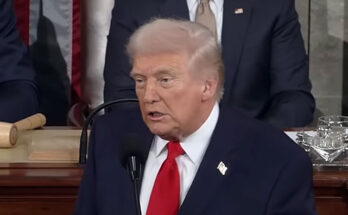Column By Mike Bibb
Since Democrats did not win the Presidency last November, it appears they have resorted to woke judicial activism to derail some of President Trump’s Executive Orders and congressionally approved legislation.
Not really anything new. The Democrats have been purposely trying to bankrupt, impeach, convict, and jail Trump for a multitude of alleged offenses for the past 10 years. He’s even survived two assassination attempts.
The press has been suspiciously quiet about the topic.
Which might account for the Dems’ plummeting popularity among the folks. Just about everyone’s heard and seen enough of these nutty stunts.
Not being a lawyer, or qualified to jump into such murky waters, I’m just wondering how an unelected federal district judge can issue an injunction to halt a President’s order simply because he/she may believe it is not in compliance with something or another?
Yet, after much discussion, the Supreme Court must take a minimum vote of 5-4 to do the same thing.
By what lawful authority can a single federal judge stop or override the President of the United States — an individual duly elected by the people?
Also, how many of President Biden’s numerous EOs and legislations — especially the ones signed by Autopen — have been paused by a federal judge?
In most of these cases, no one has ever heard of the judges making the proclamations. Federal judgeships are an appointed position, not publicly elected. It requires a sitting President to nominate a judge to a federal bench since a judicial candidate can’t nominate or elect themselves. — Art. II, Sec. 2, Clause 2, U.S. Constitution.
Then, suddenly, after becoming a federal judge, they automatically assume they’re smarter, know more, and have greater authority than the President and Congress approving their nomination.
Doesn’t make much sense to me.
Recently, the argument has been made that the appeals process enables the President to seek a reversal of a judge’s decree.
While this may be true, the controversy remains: Why should a president have to go through this rigamarole to reverse one judge’s opinion by appealing to several other judges’ opinions?
Shouldn’t the procedure be reversed? If a federal district judge believes a President’s decision in certain matters is incorrect, then wouldn’t it be logical that particular judge should initiate the appeals procedure?
Moreover, by what assumed right can a federal district judge stop or reverse a Presidential order? Judges are supposed to decide the merits of a law after someone has challenged it. I didn’t think a judge was authorized to halt, make, change, or inject his opinions of the law without first hearing both sides of the argument.
If this weren’t true, then there would be no need for a legislature or Presidential proclamations. Judges could create, decide, and change the law independently.
Kind of like they used to do before we had a Declaration of Independence and United States Constitution.
Consequently, President Trump (or any President) seems well within his jurisdiction to announce various decrees he sees fit to promote the safety, efficiency, and continued operation of a properly functioning government and society.
This is his primary job, and that’s why he was elected President. Art. II, Sec. 2 of the Constitution requires, “He shall take care that the laws be faithfully executed.”
A federal judge may be “commander” of his individual courtroom, but he is not “Commander-in-Chief” of the entire United States. Only the President has that authority.
Should a federal district judge disagree, he/she can follow the same rules as everyone else in challenging a law or edict he/she may not like.
Federal judges are numbered among a couple of million other unelected government employees. He/she is not the President or the Congress. They are the ones who authorize and approve judges. Perhaps it’s time some of these judges remembered this and deflate their egos a little.
Also, judges should remember that there are Constitutional methods for removing them from those lofty positions if it is determined that they are not complying with the rules or disrupting them.
They were appointed to perform specific judicial tasks. They were not hired to become political mouthpieces, hawking the opinions and ideologies of whatever party they may endorse.
If that’s their passion, they should run for office.
To date,15 federal judges have been impeached; eight were convicted, four acquitted, and three resigned before a verdict was announced.
The latest federal judge impeached and convicted was Thomas Porteous, nominated by President Bill Clinton in 1994.
He was accused of accepting bribes and signing false financial disclosure forms.
The Senate convicted and removed Judge Porteous from office on Dec. 8, 2010.
Impeachment only involves removal (firing) from a government position or office. It does not involve civil or criminal prosecution. That is the responsibility of the courts.
The impeachment of federal judges isn’t a very common thing, but it does happen.
Maybe it should happen more often.
The opinions expressed in this editorial are those of the author.









